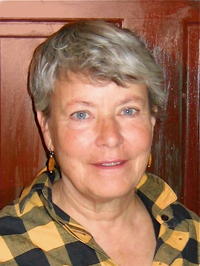NGO Conundrums: Confronting Military Interventions in Humanitarian Crises
 February 15th, 2012Ellen V. MooreBoard Member/Former Program Coordinator, Urgent Action Program, Amnesty International USAHost: Barry Erdman
February 15th, 2012Ellen V. MooreBoard Member/Former Program Coordinator, Urgent Action Program, Amnesty International USAHost: Barry ErdmanAbout the Presentation
What is the role of a human rights NGO, or an individual committed to basic human rights for all, in a situation seemingly requiring military intervention in a humanitarian crisis?
Since the utter failure of the NGO community and perhaps the United Nations apparatus to deal with the genocide in Rwanda and its aftermath, human rights organizations, peace groups, boosters of civil society, and individuals have failed to articulate a plan, a position, a role for themselves, while nation states wrestle with humanitarian crises and the inevitable calls for military interventions to halt or shorten them.
I do not come with solutions, and Amnesty International has resorted, in the absence of a clear way forward, to its traditional calls against indiscriminate bombing, disproportionate reaction/response, collateral damage.
I propose we discuss Libya, Rwanda, the former Yugoslavia, and other crises to explore our own positions as citizens, as community leaders, as individuals of goodwill. Let’s also discuss the positions we’d like to see taken by society’s International Non-Governmental Organizations like Amnesty International.
About the Presenter
Professional Experience:
Domestic:
• Served a year on the AIUSA Board of Directors June 2010-2011.
• Spring 2009 taught Human Rights: Promotion and Protection, an NGO Perspective at University of Colorado – Boulder
• 36 years with Amnesty International USA as volunteer, temp staff, and 1?2 time staff 1974-1985; fulltime staff as Urgent Action Program coordinator 1985-2007. Responsibilities included running a 24/7 human rights rapid response system, supervising over 200 college interns, developing, human rights education materials for middle school students, teachers, and parents: particularly: AIKidsUA:Children’s Edition Urgent Actions, which were featured in Scholastic Magazines, NEA Today, Teaching Tolerance, Social Education, Educating for Character, the Teach for America curriculum, Peacenet’s Net News, Free Stuff for Kids, and in Parade’s React Magazine and have been distributed to fourteen Amnesty International sections worldwide including Mexico, Nigeria, Russia, Taiwan, Argentina, and Bermuda.
• wrote parent/teacher guide, Children Can Be Human Rights Activists. Too; co-authored AIKids: Making a World of Difference, helped develop Human Rights Here and Now and initiated AIUSA’s Youth-4-Youth Program
• co-facilitated many human rights education teacher trainings as part of AIUSA’s Western Region Human Rights Educators 1983-2008. Active Trainer of Trainers in AIUSA’s training program 1985 through 2007.
• published Children Can Be Human Right Activists Too! in Social Education: the journal of the NCSS – April 1992
• created the AIUSA Archives in 1994, oversaw its development and move to Columbia University’s Center for Human Rights Documentation and Research, in 2006-7, continuing member of AIUSA Archives Advisory Committee doing Oral History videotaped interviews and liaising with Columbia University staff, 2011.
• Licensed high school and middle/primary school teacher in New York (1966-68), Quebec, Canada (1968-74), San Francisco (1974-79), Colorado 1984-2012, and guidance counselor grades 7-11 Quebec, Canada (1968-74)
• Psychometrician at Jewish General Hospital in Montreal on the Child Psychiatry Team (1968)
International:
• conducted human rights trainings with government officials, teachers, and police in Ethiopia (1995) and Romania (1997),
• collaborated on program and policy development with my Amnesty International Urgent Action and human rights education colleagues at Amnesty International’s International Secretariat in London in 1980, 1986, and 1991,
• participated in AI’s international governance at AI’s International Council Meeting in Slovenia in 1995.
Academic Experience:
• Academy of Human Rights at American University’s Washington School of Law in Summer 2004. Certificate course
• International Institute of Human Rights in Strasbourg, France in 1997 , Summer human rights certificate course
• Loyola-Marymount – summer human rights education course 1996
• University of Colorado at Boulder – 14 credits, 1986 through 1996
• San Francisco State University – 1974-79 , 12 credits in Education
• Fordham University Bronx NY– 1965-66 completed MA Psychology credits
• The New School for Social Research in Manhattan – psychology MA coursework 1964-5
• Fairleigh Dickinson University in New Jersey, BSc, double major in Psychology and Biology
• College of Notre Dame of Maryland 1960-62 – Psychology/Biology Major
Awards
• Colorado Division/United Nations Association USA 2008 Human Rights Awardee.
• AIUSA Colorado State Death Penalty Abolition Coordinator and boardmember of Coloradans for Alternatives to the Death Penalty (CADP.org) since 2007. Member of the AIUSA Colorado Cluster since its founding in 1995.
• the University of Denver Law School’s Human Rights Award for Colorado women in human rights 2001.
• the University of Denver Law School’s Human Rights Award from Dean Ved Nanda in 1998 with my husband and colleague Scott Harrison for our work in AIUSA’s internationally celebrated Urgent Action Program,
• the Boulder United Nations Association’s Human Rights Award in 1999
• co-founded the Nederland–area Mountain Forum for Peace, 1985 to the present.
Married to Scott Harrison since 1975; two children, Colleen and Max, ages 32 and 29.
